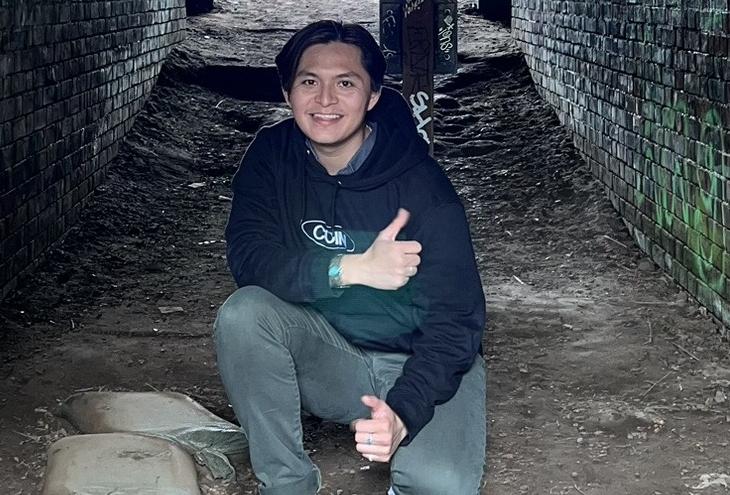The stories told to us by our elders can sow seeds that flower for later generations. For Sky Harper, Navajo (Diné), stories told by his mother, Cassandra Begay, ignited a passion for learning that can help his people. He is of the Towering House Clan, born for the Red Running Into Water Clan. His maternal grandfather is of the Big Water Clan, and his paternal grandfather is of the Towering House Clan. His mother’s tales sparked a fascination with the natural world and motivated him to understand it by pursuing a wide-ranging discipline that comes with an opportunity to give back. I chose chemistry because it gives a fundamental understanding of everything — being more applicable than physics, but still more conceptional than biology,” Harper says. “Along with that, I have always had a drive to pursue medicine, to address health care disparities my community faces. Combining both passions, the research-oriented mind of a chemist, the passion and expertise of a physician, and my own experience as an indigenous youth has been my goal.”
Engaged in research and pursuing medicine, he has set his sights on addressing inequalities in Indigenous communities. Harper, a member of the class of ’24 at Drexel University, is pursuing a BS in chemistry with a biochemistry focus and minors in biology and interdisciplinary problem-solving on a premed and honors track. With high academic achievement that has already netted the “Triple Crown” of three prestigious awards (the Harry S. Truman, Barry M. Goldwater, and Udall Undergraduate Scholarships), he is on a straight path to his professional goals. Harper is Drexel’s second-ever student to receive the Truman Foundation Fellowship, which is one of the most prestigious in the country, awarded annually to some 65 students pursuing a career in public service. He is also a 2022 Goldwater Foundation Scholar, awarded to students intent on pursuing research-oriented careers in STEM, and a 2022 Udall Foundation Scholar, awarded to students who are committed to leadership and public service in Native American health care, tribal policy, or the environment.
Born and raised in Diné Bikéyah (Navajoland), Harper is deeply connected to his culture and heritage. The Navajo Reservation where he grew up spans four states — Colorado, Utah, New Mexico, and Arizona — and covers an area of nearly 16 million acres. Like many homes in this area, Harper’s home lacked running water and electricity. His early years there taught invaluable lessons in resilience, balance, and a commitment to both Western knowledge and his own traditions. “I would never change my upbringing,” he says. “It was unique and exposed me to both worlds and philosophies, helping me become a balanced individual.”
When it came time for high school, Harper enrolled at Navajo Preparatory School, where he learned leadership skills that served him well in college. He became the Navajo Prep student body president and valedictorian, discovering how to challenge authority and advocate on behalf of students. “I learned what true leadership is,” says Harper, “I also learned how strong my voice can be when using it for a good cause.”
Harper’s academic journey took off during his third time as a finalist for the prestigious Intel International Science Fair, competing among more than 2,000 students from 70 countries. This achievement caught the attention of Drexel University admissions officers, who offered him a full scholarship. Despite being accepted into other universities, Harper knew that Drexel was the best fit.
Although he was clearly talented and motivated, being one of the few Native American students at Drexel proved challenging. Instead of simply toughing it out, Harper saw an opportunity and founded Drexel Indigenous Students of the Americas (DISA), the first Native American student organization. “A few things my organization has done are advocate for a land acknowledgment plaque on campus, host the first Indigenous Peoples’ Day event, and offer informative sessions on Native American history,” he explains.
A member of AISES since his first year of high school, Harper was sponsored as a Sequoyah Fellow by The Boeing Company and regularly presents research posters at the National Conference. “Through AISES, I have made so many valuable connections. I’ve found many resources such as scholarships and other opportunities,” he says, “And I’ve been able to get very personal letters of recommendation.”
Through his research endeavors, Harper was listed as an author on a paper regarding plasma polymerization, research he's been involved in since his freshman year in the chemistry department with Dr. Frank Ji. He's also been conducting part-time research with the USDA – ARS (United States Department of Agriculture – Agricultural Research Services), starting at BARC (Beltsville Agricultural Research Center) before his freshman year of undergrad, and moving to the Eastern Regional Research Center, working with Dr. Andrew Gehring in the Molecular Characterization Foodborne Pathogens Unit (MCFP). Harper has been involved in other labs regarding cognitive neuroengineering and liver cancer research, and has recently completed an internship at Gilead Sciences Inc., designing and synthesizing novel pharmaceuticals.
Harper’s ultimate goal is to become a physician-scientist and advocate for research infrastructure on the Navajo Reservation, where he will start a research laboratory utilizing community-based participatory research practices to address and minimize health care disparities. Harper plans to get there through an MD-PhD program at the Medical Scientist Training Program (MSTP) of the Mayo Clinic College of Medicine and Science and a postdoc at the National Institutes of Health. “The MSTP prepares physician-scientists to translate scientific discoveries into medical solutions to improve patient care,” he explains. “I believe this program would greatly develop my skills as an advocate medical-scientist for Indigenous populations.”
His “Triple Crown” win of the three prestigious scholarships, his involvement in multiple laboratories, and his participation at conferences are solid evidence of his dedication to research and should go far in helping him become the health care advocate and researcher he hopes to be.













